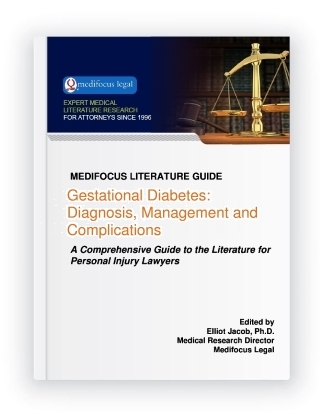Gestational Diabetes: Diagnosis, Management and ComplicationsA Comprehensive Guide to the Literature for Personal Injury Lawyers
Publisher: Medifocus Legal
Publication Date: November 9, 2020
Number of Pages: 142
A Comprehensive Guide to the Literature for Personal Injury Lawyers
Publisher: Medifocus LegalPublication Date: November 9, 2020
Number of Pages: 142
Typically, the vast majority of women who develop gestational diabetes remain asymptomatic. When symptoms are present, they may include generalized fatigue, blurry vision, excessive thirst, and frequent urination. Although the exact cause of gestational diabetes is not known, several risk factors have been identified that include:
- Gestational diabetes in a previous pregnancy
- Family history of diabetes
- Obesity
- Excessive weight gain during pregnancy
- Polycystic ovarian syndrome and other conditions that are associated with insulin resistance.
- Black, Hispanic, Indian-American or Asian-American ethnicity.
Women with gestational diabetes are at higher risk for developing high blood pressure or preeclampsia, having a C-section delivery, and type 2 diabetes in the future. Babies of mothers with gestational diabetes are at increased risk of:
- Fetal macrosomia - very large babies weighing 9 pounds or more
- Shoulder dystocia - entrapment of the baby's shoulder in the birth canal during delivery can lead to obstetrical brachial plexus palsy
- Preterm birth
- Stillbirth
- Hypoglycemia - low blood sugar shortly after birth can cause seizures and breathing difficulties
- Obesity and type 2 diabetes later in life
Research has shown that some specific lifestyle modifications may reduce the risk for developing gestational diabetes. These modifiable risk factors include eating a healthy diet, regular physical activity, starting pregnancy at a healthy weight, and preventing excessive weight gain during the course of a pregnancy.
In most cases, diagnostic screening for gestational diabetes is performed between 24 and 28 weeks of pregnancy. Routine screening usually consists of an initial glucose challenge test and a follow-up glucose tolerance test. If glucose levels are abnormally high, the treatment options for gestational diabetes include:
- Lifestyle modifications such as diet and exercise
- Self monitoring of blood sugar levels several times each day
- Insulin injections
- Close monitoring of fetal growth and development
- Follow-up blood sugar testing after delivery and again at 6 and 12 weeks to ensure that blood sugar levels have returned to normal.
The MediFocus Literature Guide to Gestational Diabetes captures the clinically relevant articles published over the past 10-years in peer-reviewed medical journals and focuses on the risk factors, diagnosis, management, and complications of this potentially serious pregnancy-related disorder. This unique Literature Guide consists of nearly 200 hand-selected articles with links to the Abstracts and includes online access to the FREE full-text version of 78 articles. The Guide also includes a valuable Author Directory for quickly identifying and locating medical experts for case evaluation and expert testimony.
 |
- A comprehensive bibliography of 198 journal article references indexed in MEDLINE published in well respected medical and scientific journals.
- Online access to the abstracts (summaries) of the articles.
- Online access to the free full-text version of 78 articles.
- Links to full-text sources of other articles that are available for purchase directly from individual journal publishers.
- A unique "Author Directory" consisting of the names and institutional affiliations of experts who have published and have specialized knowledge about Gestational Diabetes: Diagnosis, Management and Complications. The "Author Directory" is a valuable resource for quickly identifying and locating experts for case reviews, opinions, and testimony.
Select examples of topics that are covered by the articles referenced in this Guidebook include:
- Increased risk of neonatal complications or death among neonates born small for gestational age to mothers with gestational diabetes.
- Diagnostic Strategies for Gestational Diabetes Mellitus: Review of Current Evidence.
- Optimal management of gestational diabetes.
- Gestational diabetes and the risk of cardiovascular disease in women: a systematic review and meta-analysis.
- Gestational diabetes risk factors and long-term consequences for both mother and offspring: a literature review.
- Maternal gestational diabetes mellitus and the risk of subsequent pediatric cardiovascular diseases of the offspring.
- Insulin therapy and its consequences for the mother, foetus, and newborn in gestational diabetes mellitus.
- Increased risk of cardiovascular disease in women with prior gestational diabetes: A systematic review and meta-analysis.
- ACOG Practice Bulletin No. 190 Summary: Gestational Diabetes Mellitus.
- Planned birth at or near term for improving health outcomes for pregnant women with gestational diabetes and their infants.
- Delivery outcomes of large-for-gestational-age newborns stratified by the presence or absence of gestational diabetes mellitus.
- Gestational Diabetes Mellitus: Post-partum Risk and Follow Up.
- Screening and Treatment for Early-Onset Gestational Diabetes Mellitus: a Systematic Review and Meta-analysis.
- Immediate delivery or expectant management in gestational diabetes at term: the GINEXMAL randomised controlled trial.
- Timing of delivery and pregnancy outcomes in women with gestational diabetes.
- Can a single preterm ultrasound accurately predict birth weight in gestational diabetes?
- Gestational diabetes mellitus and macrosomia: a literature review.
- Is gestational diabetes mellitus an independent risk factor for macrosomia: a meta-analysis?
- Prediction of fetal macrosomia with ultrasound parameters and maternal glycemic controls in gestational diabetes mellitus.
- Foetal and neonatal complications in gestational diabetes: perinatal mortality, congenital malformations, macrosomia, shoulder dystocia, birth injuries, neonatal complications.
is available in two formats: | |
Order by Phone:To order by phone, please call: Order by Mail:To order by mail, please print and complete this Order Form | |

